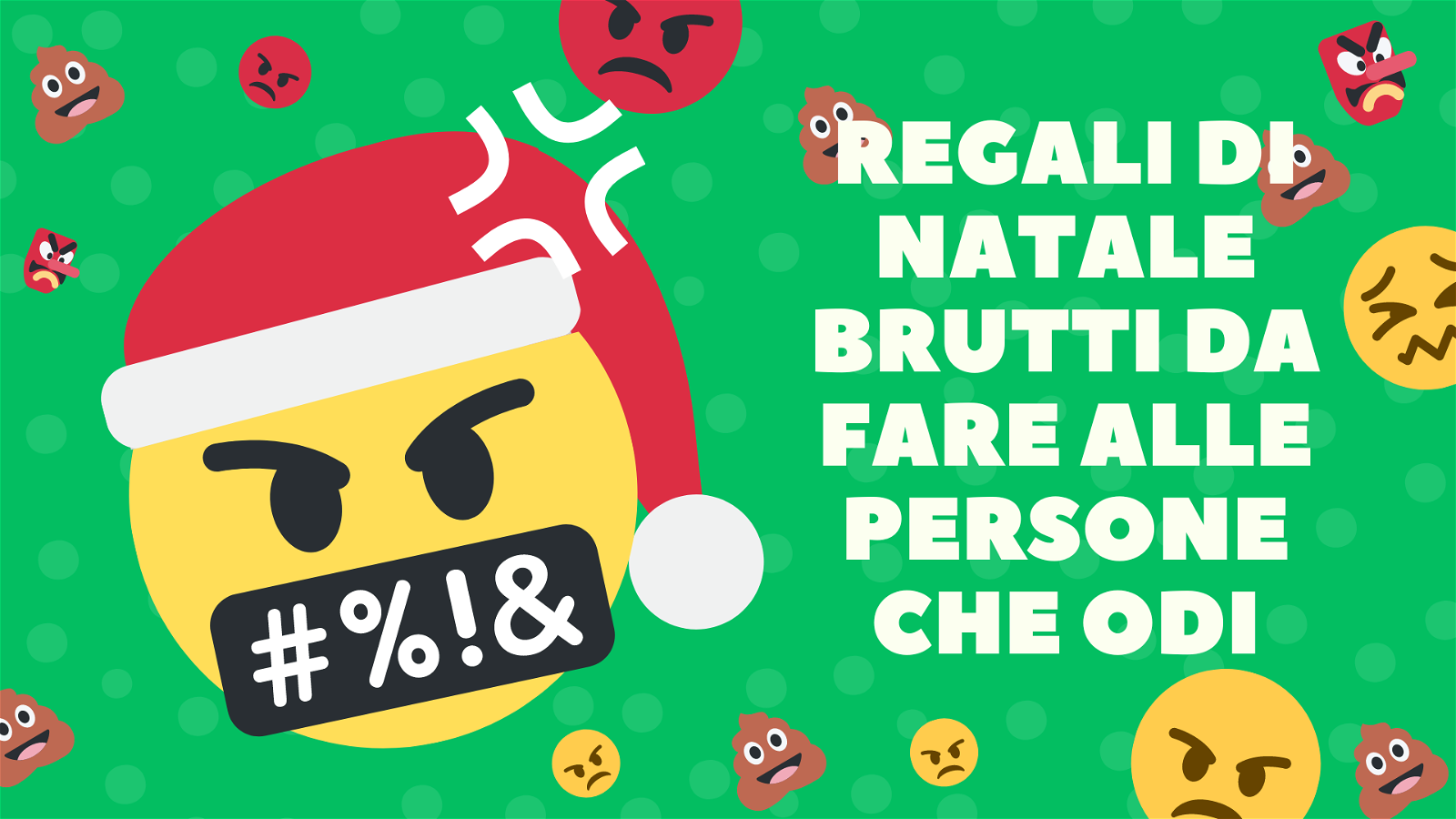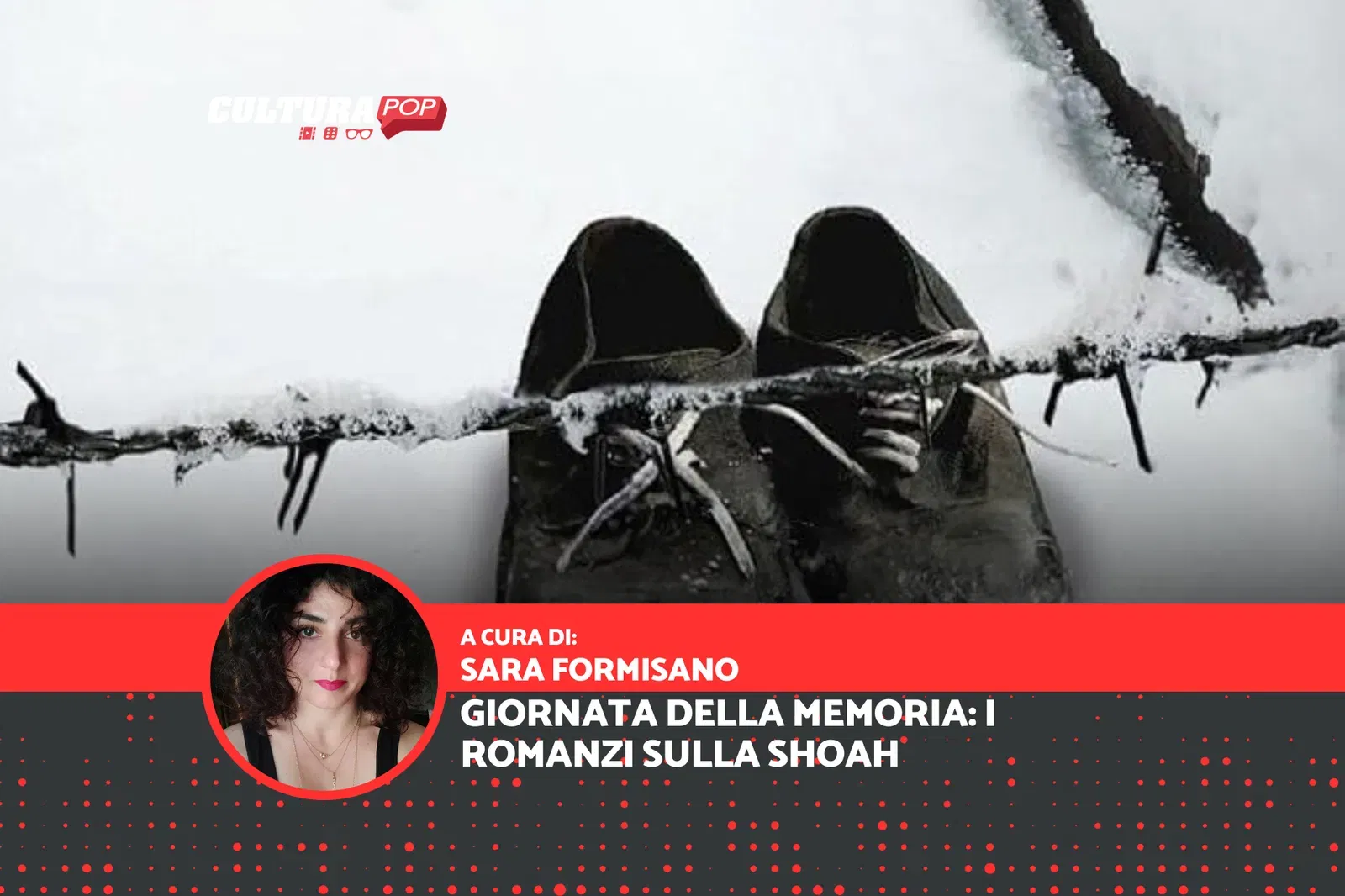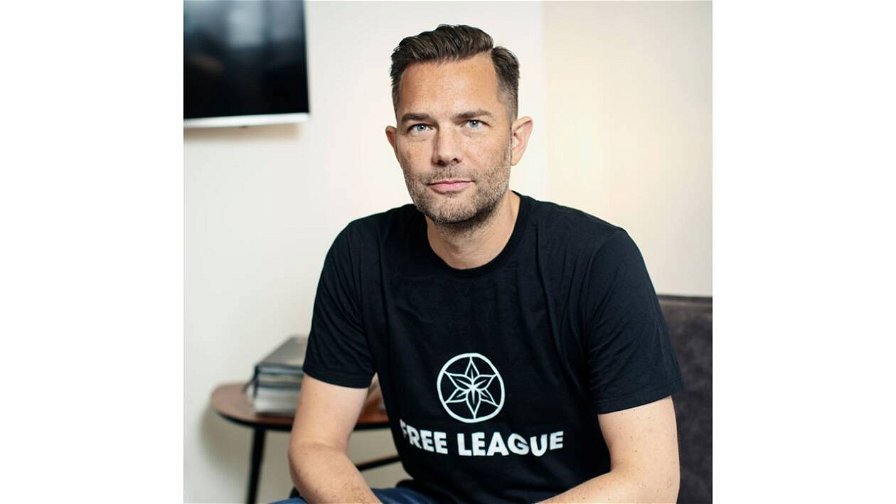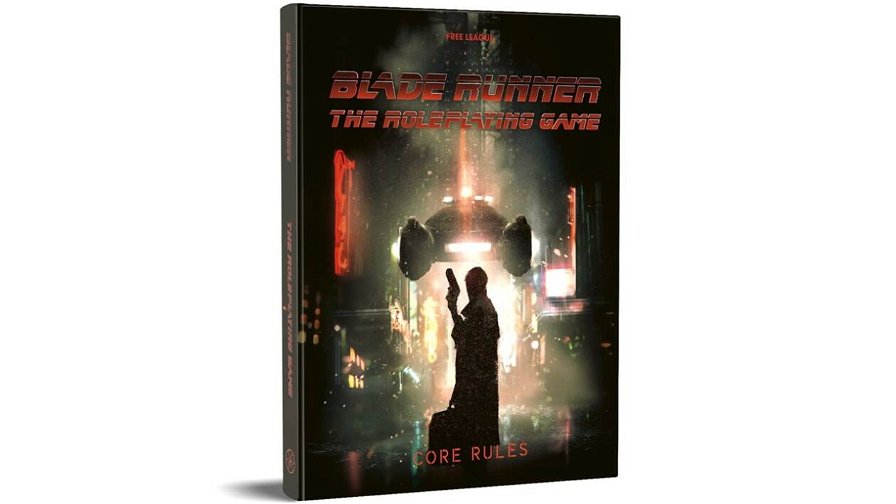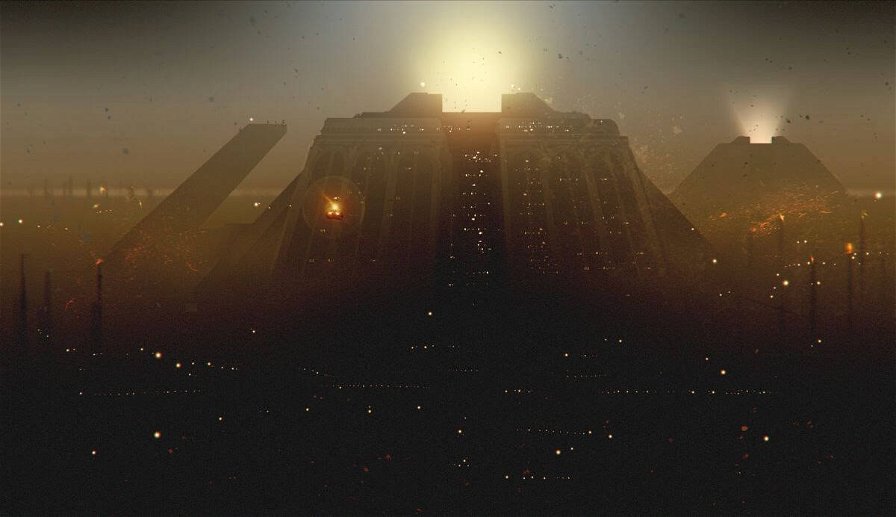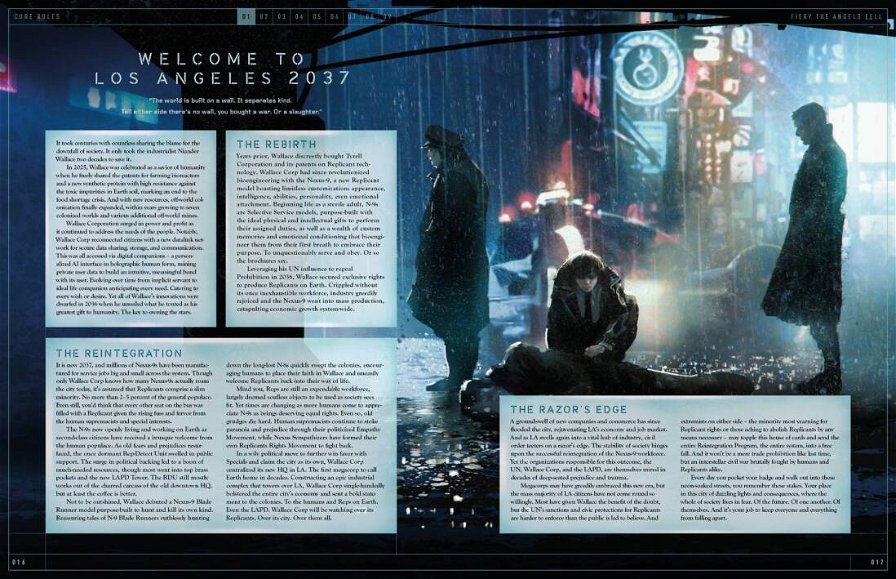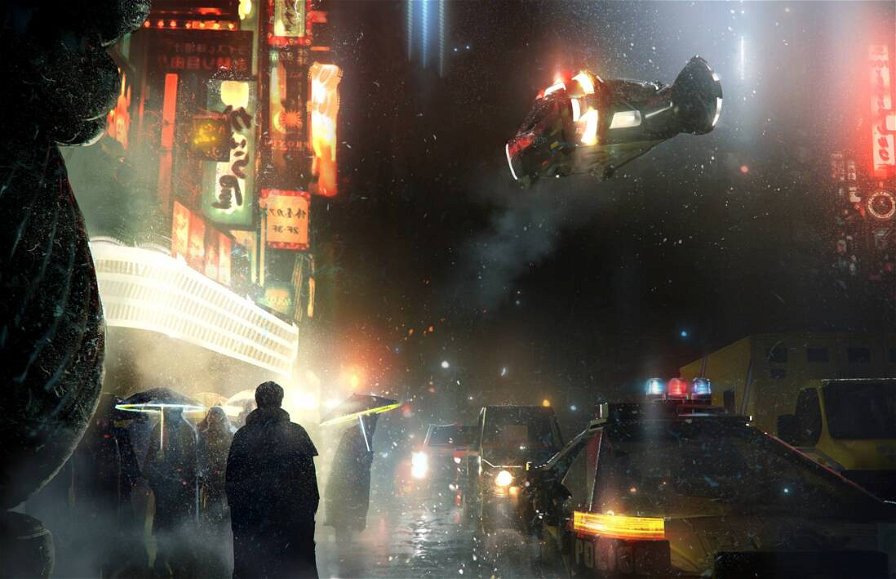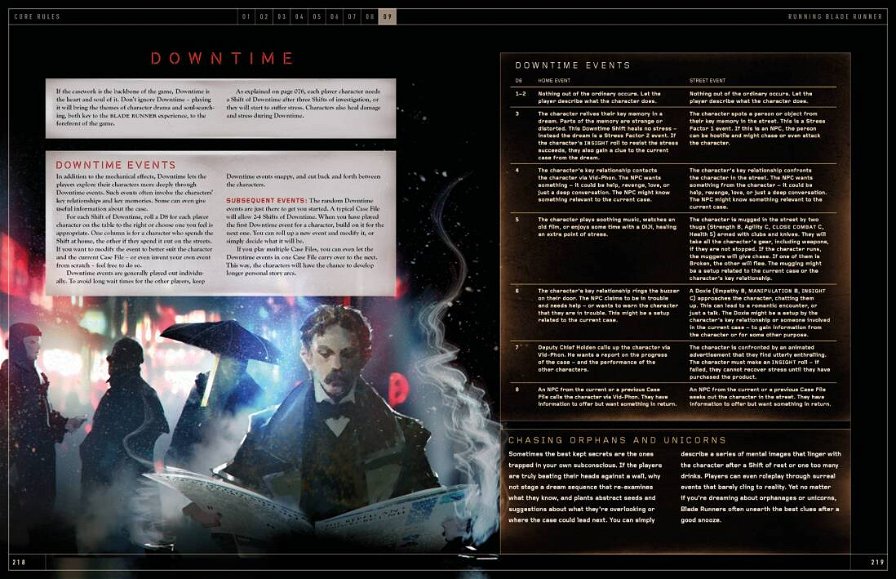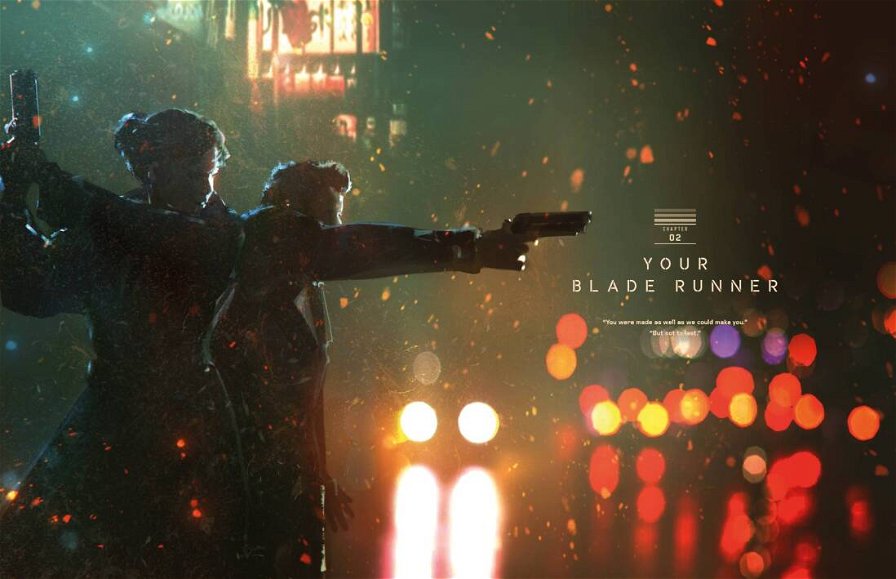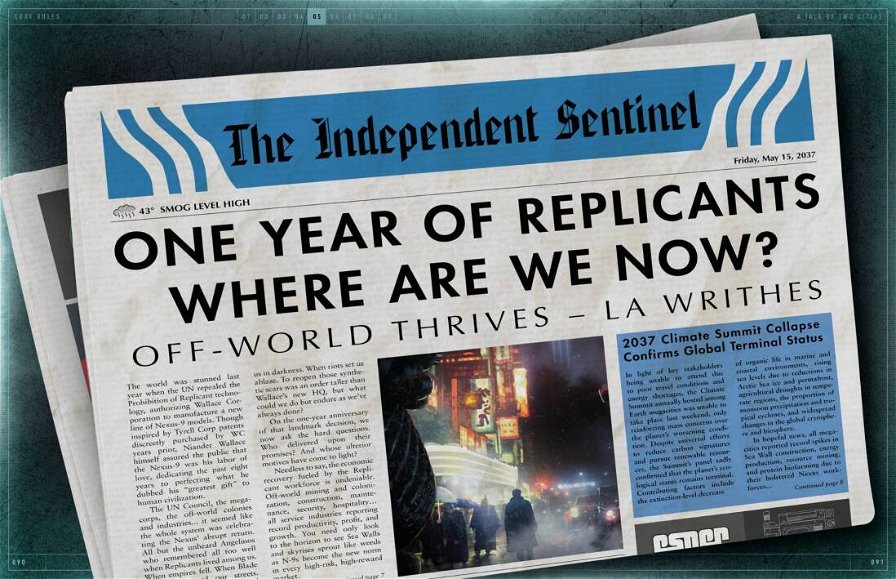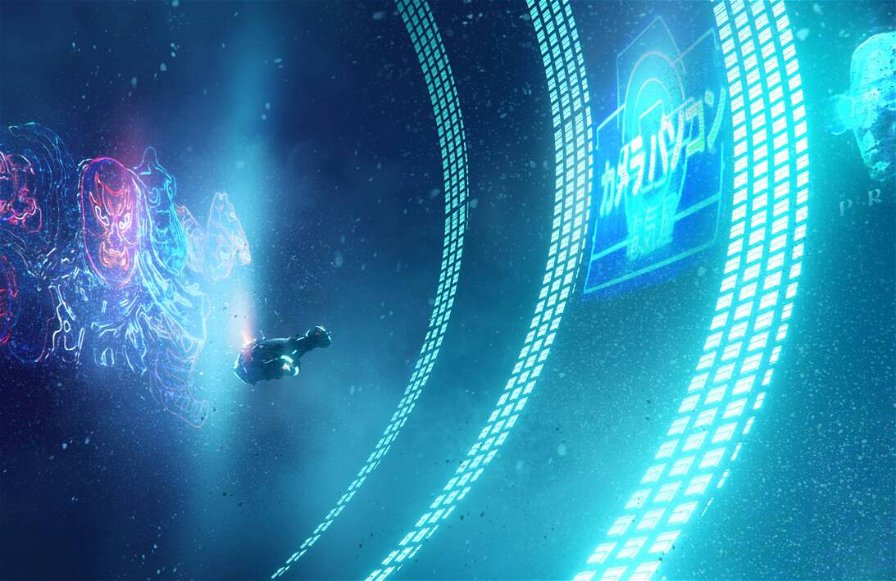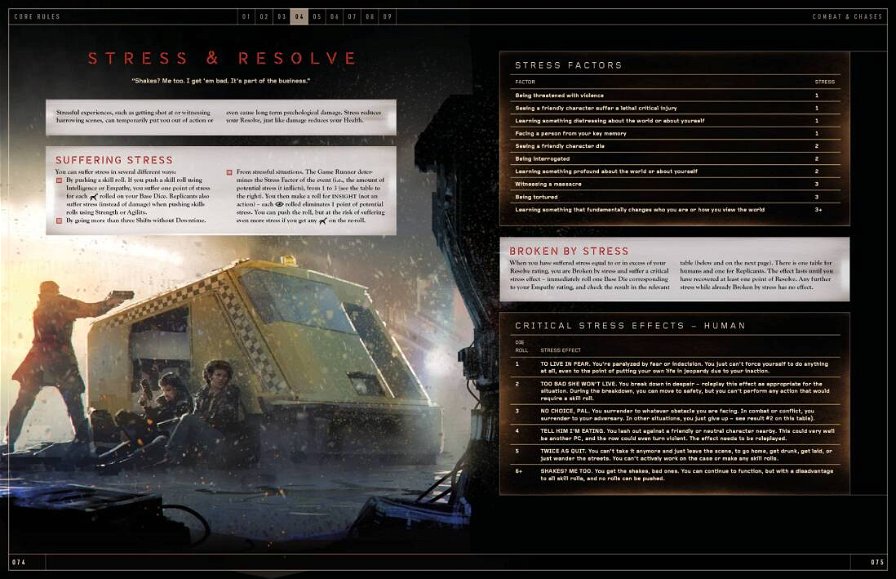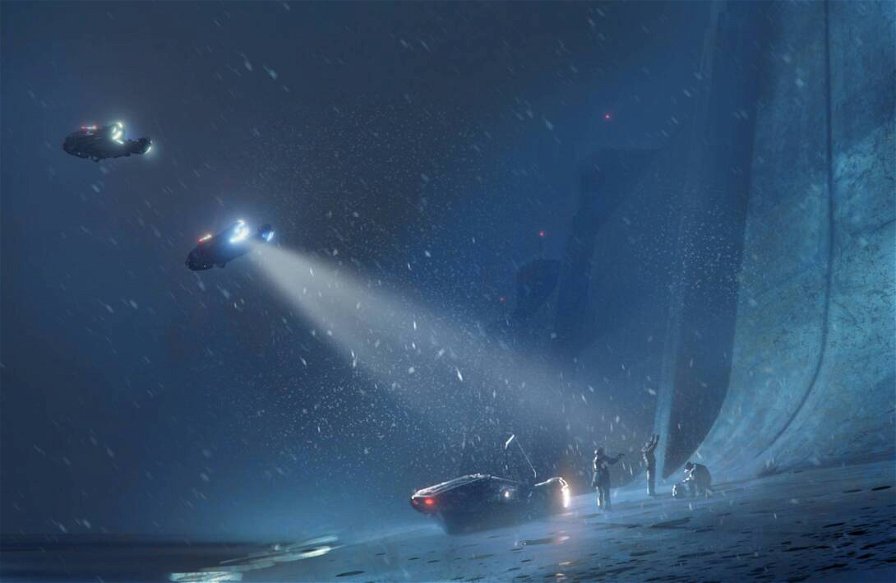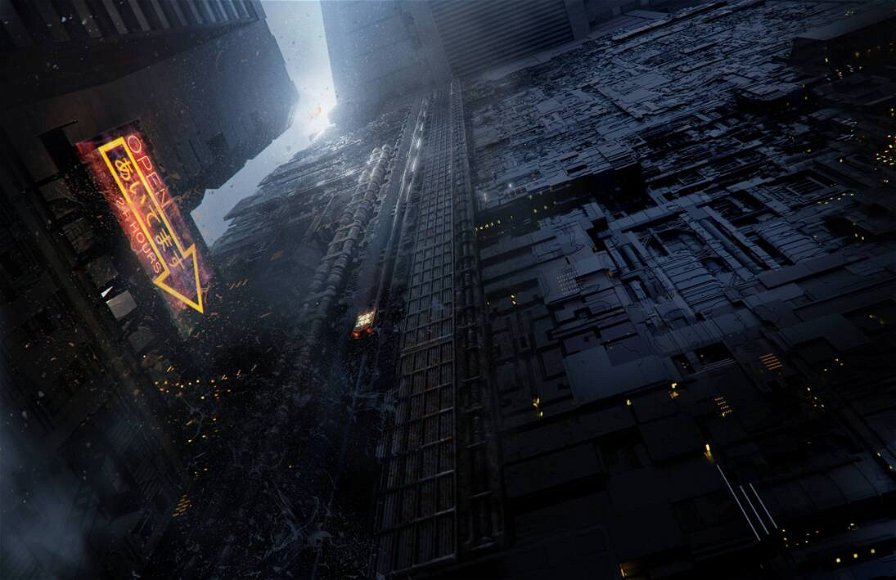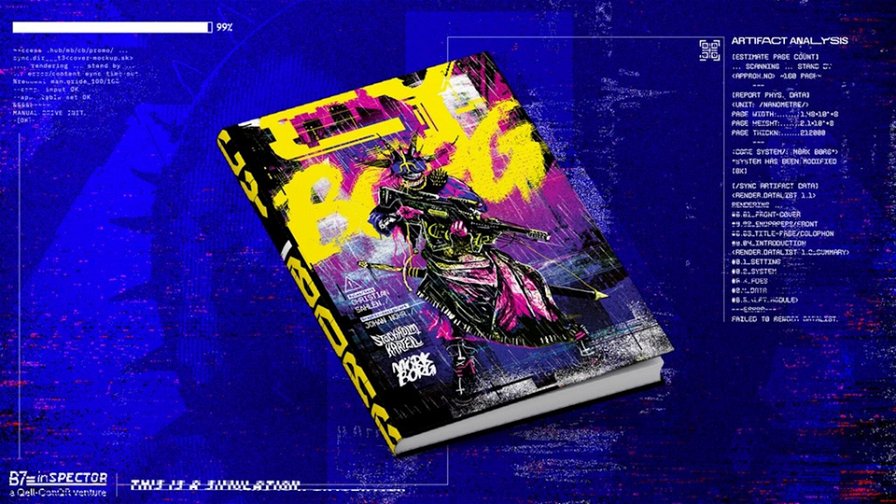In September, the news of the launch by the Swedish publisher Free League Publishing (Fria Ligan, in his homeland), in 2022, of Blade Runner RPG, the official pen-and-paper role-playing game of the iconic Blade Runner sci-fi saga has caused a lot of hype among RPG fans and insiders.
We at Cultura Pop have therefore asked Tomas Härenstam, co-founder and CEO of Free League Publishing and successful game designer thanks to his Year Zero Engine, the game system at the base of most Free League’s RPGs, the possibility of ask him a few questions about Blade Runner RPG. Tomas was therefore kind enough to offer us an interview via Skype, in which we received more information and some rumors about this very interesting new project and about Free League Publishing in general.
So we leave you to this very interesting interview!
Blade Runner RPG, interview with Tomas Härenstam
Hi Tomas and thank you very much for your friendliness! It’s a pleasure to chat with you again, after the interview you gave me on the launch of ALIEN RPG. For those of our readers who may have missed it, could you kindly say a few words about yourself and Free League Publishing?
Sure, yeah, we are a publisher of tabletop rpgs, some board games and art books. We're based in Sweden, in Stockholm, and we've been around for about ten years now. We started in 2011, but we started very small, and we've sort of been growing step by step and we've done a bunch of different rpgs in the last few years, including ALIEN that you mentioned and a bunch of others too.
The news of the upcoming release of Blade Runner RPG has been received with great enthusiasm by Italian players, can you give us a brief introduction to the game and tell us what Blade Runner RPG is?
Yeah, it's a tabletop RPG based on the Blade Runner franchise, so both films but also the other media that has been produced. There are video games, comics and other media that have been published in the last few years. It's done under license from Alcon Entertainment, who is the producer of the most recent film, so we work with them to ensure that this is in line with the universe and the Blade Runner lore and everything.
It uses a similar rule set as the ALIEN RPG and most of our other games, something we call the Year Zero Engine internally, but it's adapted. It's not that one system, it's very much adapted to the setting of the game as such. And we're now kickstarting the game. We're in the middle of the Kickstarter and it runs out about a week from now when we're recording this interview.
Blade Runner RPG was the most anticipated RPG of the year and in fact the Kickstarter campaign is doing very well, with more than a million euros raised, and with just a few days left to go, only a handful of stretch goals remain to be unlocked. Did you expect such an amazing success?
We knew it would probably be quite popular in terms of that. We've done several Kickstarters before and we knew that Blade Runner is a big well-known franchise. We announced this game back in September, I think, so we've been sort of discussing it a while and people were expecting it to come. So, we suspected it would do quite well, but still given that, we're still surprised that it's doing this well, it's really exceeding our expectations.
After ALIEN RPG, Free League Publishing produces another tabletop roleplaying game based on another very important and iconic IP. How is it working on such iconic projects? Is the pressure greater than in developing an RPG unrelated to third-party IP?
Yeah, of course, you feel you want to make the franchise do it justice, a Blade Runner RPG really has to live up, you know, the expectations that players and fans will have. So, yeah. there is a bit of extra pressure there, but it's also so much fun. I mean, to just dive into this world and explore it and sort of make it your own, and this interacting with the community that's already there… So, it's been great, but you know, we have to do it right, we can't mess up.
You just told us that Blade Runner RPG will be based on the two films released so far and the comics and other material released, so the RPG will be canon, like ALIEN RPG?
Yes, correct, yes it will definitely be a canon in the lore of the Blade Runner universe. We have decided to set it in the year 2037, which is sort of in between the two films. So, in that sense we're also co-creating a bit of the universe, about what's going on in that particular era of the universe, that has not been so much described before. There was one of the short films that was done and released right before Blade Runner 2049, that was actually placed in 2036, so the year before our game is set. And that short film showed how the Wallace Corporation introduces replicants, a new generation of replicants, on Earth, and that's kind of our stepping off point. And that's why we set the game one year after that. So, that's kind of the baseline, the premise of our game.
So, there will be a figure delegated to adhere to the canon such as Andrew E.C. Gaska (whom we had the privilege of interviewing some time ago) for ALIEN RPG?
Yes, that's right, we have a setting writer, his name is Joe LeFavi. He's also our agent who brokered this agreement with Alcon, so he's two important jobs in this project. He has been working with Blade Runner brand before, as an editor for Blade Runner 2049 art book and some other things, so he's very much an expert on the lore and has experience of working with it. I mean, of course I know my way around Blade Runner as well, but he's the true expert on the lore.
Will Blade Runner RPG be linked exclusively to the Blade Runner movie franchise or will it also contain elements from Do Androids Dream of Electric Sheep?, the Philip K. Dick novel from which the film saga draws inspiration?
Licenses are limited in their scope, and they have very specific lines and the book is not covered by them. We will not draw directly on the book by Philip K. Dick then. Obviously, there are elements from the book that were also, you know, carried on through the films and of course we are working on that. So, there will be elements that can probably be traced back, but technically the license does not cover the book.
Dick's novel is considered by many to be a sort of forerunner of the cyberpunk genre, and the movie Blade Runner itself has contributed greatly to the definition of the cyberpunk imagery, at least from a visual and setting point of view. Will Blade Runner RPG somehow dive also in classic cyberpunk themes, such as those typical of William Gibson's Neuromancer?
Well, it's an interesting question. To my mind, of course, there are similarities between Blade Runner and what we know as cyberpunk, but personally I don't feel Blade Runner really is cyberpunk per se. It's related, but it's not really cyberpunk to my mind. I think Blade Runner is really its own thing, we call it “neon noir”. It's related, and as you said, the imagery, kind of the visuals, are relatable to cyberpunk, but there's many things in cyberpunk that you don't see in Blade Runner and vice versa. So, I really think Blade Runner is its own thing, its own genre almost, of this neon noir. It's very much a noir films, but in this futuristic cityscape. And so, we're not approaching it as a generic cyberpunk game, but it's very specifically a Blade Runner game.
Blade Runner RPG, setting and characters
Talking about the setting, will the characters move only in Los Angeles, or will they be able to explore other places, such as those shown in Blade Runner 2049 or the much-mentioned off-world colonies?
Primarily, to start out, the core rule book focuses on Los Angeles. It does mention and describe some other locations as well, but more in brief. The initial case file, which is what we call the scenarios of the game, it's called Electric dreams and it's also set in Los Angeles, so we will be focusing on Los Angeles. Also, the Starter Set will have a map of Los Angeles. The core book will describe different sectors of the city, so it's definitely the focus. And we feel there is so much to explore within the city, so that's keeping us more than busy for now. But down the line it's certainly possible that we might be able to explore other locations as well, but a that's a question for the future.
The themes of Blade Runner are extremely complex. Empathy, morals, the uncertainty of not knowing who you are, are just some of the themes covered by the works of the franchise. How will these and other themes be addressed in Blade Runner RPG?
Yes, right, that's really the big challenge of creating this game to get, because there's so much depth and layers and existential themes going into Blade Runner, that you might not see in other sci-fi, that might be a bit more straightforward. And we wanted to bring those themes into the game and that has really been the main challenge and it's done in many different ways, really. There are game mechanics that will feed into it, there's also the way case files are designed, just the content of the case files. The ones that we'll be making will bring these themes in into play.
So, they're in a variety of different ways. On the mechanical side or character side, you have something. Every player character has a key memory and a key relationship; and those memories and relationships will kind of form game play and be used in different ways. That's just one example of how to bring in this kind of existential theme and personal introspection almost into the game.
But it will be a quite demanding game to play, I think, to get it. You know, it's not really a what do you call them “beer and pretzel game”, it's not really that. It takes a bit of effort. I think you need to kind of focus on the game experience, to get the full result from it. So, it's a demanding game to design and also can probably be a demanding game to play. But also, a lot of fun and very rewarding.
The films of the Blade Runner saga tell purely personal experiences, in which the single protagonist tackles the issues we have just talked about and is practically overwhelmed by them. Was it difficult to transform such an intimate and personal experience into something that could be experienced by an entire group of players?
Yes, that was also a challenge, since, as you said, the Blade Runner films have focused on a single protagonist, while in role-playing you will most likely have a group. We have tackled this in a couple of different ways. One is to keep the group size down. This is not a game to have like six, seven, eight players, it would not work. So, we have said that we recommend it to be played with a Game Master plus one to four players, but probably not more than that. It works well with just a single player, which is obviously it works, but also with two or three and four work.
And to manage that like a small team of Blade Runners. There's a couple of different ways we do that, and one is how the case files are structured. You will be encouraged to actually split up the party, from time to time, to actually cover more ground and faster. So, you will probably split up and run scenes like cut between scenes, where one character goes to one place, and another go somewhere else. You kind of cut between like in the film and then each scene can be a bit more personal and smaller in scale.
You also have something called “down time” which is what the characters do in between shifts, when they're out resolving cases and doing the investigation. So, during down time you also get the chance to play individual scenes for each character, and that's when the key relationship and things like that come into play. So, you can kind of focus on your own individual character, and at the same time you want to keep these individual scenes fairly short, so that you don't keep other players just waiting around. But this game does focus a bit more than most games, and most of our other games, also on the individual characters. You will have more individual scenes maybe, than you have in most role-playing games.
Now let's talk about the characters: what kind of characters will it be possible to play? Will they all be agents of the LAPD's Blade Runner unit, or will it be possible to play outside the police?
Initially, as part of the core rules we have decided that all player characters will be Blade Runners. We felt that was a natural starting point and we wanted to limit it to that, initially at least, because the way gameplay works it's focused on investigations and solving cases, and then it makes sense that you are someone who does that for a living, that's the premise of the game. So, for that reason all player characters are Blade Runners.
They can be human Blade Runners or replicant runners, as seen in Blade Runner 2049, but all characters will be blade runners, that's the idea. But then, Blade Runners themselves can come in many different shapes and sizes. You know, you have Deckard and Gaff in the first film; they're quite different, they're not very similar at all, so we have a number of what we call “archetypes” and we have added some more now, as stretch goals in the Kickstarter. So, now we have, I think, seven different archetypes that you can choose from.
We have one called Inspector, which is more of a typical K or Deckard style investigator, we have an Analyst, who is more of a technical crime scene investigator person, we have a City Speaker, who is a bit of a Gaff type city street person. There is a Doxie, who's more of a social infiltrator, the Enforcer, who is more of a special forces type person, and we have a Skimmer, someone who's a bit of almost like corrupt cop type of person, and a few more. So, basically within the concept of Blade Runners they can be quite different, they don't all have to look like Deckard or K, they can be quite different from that.
Thus, it will be possible to choose whether to play a human or a Replicant. How will the latter be defined? Is it intended that a player may later discover that their character is actually a Replicant?
Yeah, that this has been an interesting kind of balance where it comes to handling replicants in the game, because on the one hand we want replicants to feel different when you play a character who's a replicant. On the other hand, they are still close to being human and that's kind of the point in the way of Blade runner, that the humanity of a person is not really defined by if they're human or replicant, it's by their actions, really. And so, we didn't want to turn the replicants into robots, because there's clearly not, they're much more human. So, there are some important but fairly subtle differences, when it comes to mechanics between replicants and humans.
As for the other question on whether you can't kind of discover yourself to be a replicant in the game, yes that is possible. We do have such an option. When you create a character, you can choose to be replicant or choose to be human. If you choose to be replicant then you are, and that's like K basically in Blade Runner 2049. If you choose to be human, there is a choice. The way we set it up it's not a mandatory, it's more of an option for players, because some players enjoy being surprised about who their character is, but other players hate that. They don't want that kind of surprise in their game. So, basically, we have a choice where a player can say: “Yeah, I want it to be possible that I might be a secret replicant”.
And then, there is a dice roll that is done hidden, and if that turns out in a specific way, that character is actually a replicant and then the game master can introduce this fact, reveal it sometime during the game in some way that makes sense and kind of creates an interesting situation in the game. But we set it up, at least in the rules, is this is an option, not a mandatory thing.
Blade Runner RPG, system and mechanics
Blade Runner RPG will therefore be an investigative game. How will this aspect of the game be structured? Will there be similarities with other investigative RPGs such as Call of Cthulhu or Trail of Cthulhu?
Sure, there are certainly similarities the like those games, this is also focused on investigations, I think. What we're doing is structuring things a little bit differently. This game is also quite a bit inspired of a game that is not a roleplaying game: the Sherlock Holmes Consulting Detective games. I'm not sure if you're familiar with those, but basically in that game you have a bunch of handouts, you have maps handouts, things, and you can kind of choose where you want to go. And then there's an entry in a book and you can read it and see what's actually there.
That's not a roleplay game but what we're doing is a bit similar to that is you'll have this large map of LA, you'll have handouts, you'll have locations, you'll have NPC, mugshot photos and all kinds of things. And you'll kind of use all of those handouts and evidence that you'll collect during the game, to build your case or kind of reveal what's behind it. Handouts are really important.
We're also dividing the day into four shifts, so basically in each shift you will go to one or another location, you can split up to go to different locations at the same time, if you're more than one player. So, in each shift you will go to some location and find evidence, speak to NPCS, try to solve the case, basically. And at the same time, there is a countdown, and this is really important.
Because it kind of creates pacing, because investigative role-playing games can get bogged down into detail or even drown completely, if the players go someplace where there's nothing to find, or they get stuck in detail and that's kind of the drawback of investigations and role-playing that they can kind of just bog down into, and the game doesn't progress. But what we do here is we have something we call “Countdown Events”, so there will be a series of events that will escalate the situation. And they will keep happening, no matter where the player characters go. So, this means there will be like a timer, like a time pressure to solve the case before something happens. So, you will always be in under a bit of time pressure, and that's also a key component in how we structured the investigations.
We know that Blade Runner RPG will use the Year Zero Engine, which has proven to be an extremely flexible game engine and easily adaptable to many different settings: the mechanics of Stress in ALIEN RPG and that of physical and mental injuries and their consequences in Vaesen are a clear example. Will there be anything like these mechanics in Blade Runner RPG?
There is something like it, yes. There is a stress mechanic, but it doesn't quite work as in in ALIEN, because it's not a horror game per se. You have two ratings: you have a Health rating, which is basically hit points, and then you have a Resolve rating. And the Resolve rating is decreased when you suffer stress of a number of different reasons, such as stressful situations or not taking enough down time… Several things can reduce your Resolve. And basically, when Resolve hits zero or runs too low, you can trigger a critical stress effect, which is like a mental critical hit almost.
And that can trigger certain effects that you in for a minute or for a moment to lose control of your character and you will do something unplanned, unwanted, and it can trigger certain actions. So, this is in a way similar to ALIEN, but it does not use exact same rules and it's not as dramatic as in ALIEN. It's a bit more subtle, because this is not a horror game, so we don't want those total panic attacks happening. That's not really Blade Runner, so it's a bit more subtle, but it's similar in a sense.
Looking at the Blade Runner RPG Kickstarter page, I noticed that the game will not use large pools of six-sided dice, but the growing dice system already used in Twilight: 2000. We should expect that future games made with the Year Zero Engine will use this different system or will there still be products featuring the previous dice system?
Right, this is a version really of it, so no, we can definitely expect new games in the future, some of them, will most likely use the d6 dice pool thing that you have seen before. The reason we're doing trying this different version out is that basically Twilight: 2000 and this game were developed a little bit at the same time, so the idea of trying out a system of a version of the engine that uses two dice instead of a dice pool.
It kind of appeared and we used them, tried them out it worked for Twilight: 2000. And the reason was that you added something called Ammo Dice and adding Ammo Dice into already large dice pools would just have created insanely large dice pools and it would not really work. So, we tried to find a way to reduce the size of the dice pool for Twilight: 2000 and that's why we used it there.
For Blade Runner RPG, you don't have Ammo Dice, so that's not the reason there, but we felt instead that on the gaming table you had lots of handouts and evidence and maps and things, and also, you'll have a lot of things going on, you know. You're gonna be focusing on your characters when you play, there's character development going on, so we felt having like a large dice pool on top of that, like throwing eight or ten dice on top of all these handouts it's just it will be too much. It would take too much attention from the players and on the table, so we felt we needed a slimmer smaller system where the dice rolls take up a little less space both on the table and in the minds of players.
So, we needed a more slimmed down system, and that's where we tried out this one. It's different, of course, as you roll two dice instead of a dice pool, but the math, the probabilities, behind it are not that vastly different. The rules work largely in the same way, so if you're familiar with the other Year Zero Engine games you won't be totally lost in this one. You'll recognize a lot of things so, but that was the reason that we wanted something smaller something slimmer.
But maybe when we do a new game, whatever that would be the next one, we might use the D6 again, if that works better for that particular game. So, it will most likely well really be using both versions of the system going forward.
The artistic side
We know that the illustrations will be the works of the very talented Martin Grip ...
Right, Martin Grip is our in-house, he's an artist, he's a part of Free League and has been for years and he's one of the co-owners and so on so. He's not just an artist that we hire, but he's part of Free League and for me, I've known him for several years now and I always felt his style was perfect for Blade Runner and ALIEN and other games. But really, when we started working on Blade Runner RPG, I always felt that it has to be him, because I think his style is just perfect for Blade Runner. It has that kind of moodiness, the high contrast, the light and the way he can kind of create.
I think his work is perfect for role-playing because it leaves just the right amount to the imagination of the player to fill in; just the kind of the way he works with shadow, and I think it just captures the mood of Blade Runner perfectly. So, I'm really happy that he was able to basically do the entire game. We do have other artists, who do some smaller pieces, we have a great artist called Gustaf Ekelund, who does like mug shots and smaller pieces of art also, but all of the main art, the big pieces, are by Martin.
About Free League Publishing and upcoming releases
We have learned that art, graphics and illustrations are a distinctive and fundamental aspect of every Free League Publishing product, what can you tell us about this?
I guess that was never a choice, it's just always been that way. We started out, well now it's ten years ago, and I think one of the reasons is that one of the founders of Free League was a graphic designer, his name is Christian Granath, and he does all the graphic design still, like the layouts or at least kind of. He doesn't do every page, but he does that overall design for our games, and I think that meant. And he's also, obviously, a big role player, you know. I think, that was one of the reasons, that from the very beginning like graphic design and art and the way the games look, not only the way they play, has been important, it was just always like that. It was never a choice that we said: “Oh now we really need to focus on this”, it was just natural, it's just the way it came to be.
And I do think that also there is a tradition, I mean Sweden has a long traditional role playing, I think overall that, that the standards of illustrations and graphic design have always been fairly high for RPGS here. So, I think that also factors in that it's part of a bigger tradition, really, so not just us. And then Martin Grip was part of another publisher called Team Jarnringen, and who did another game where we joined forces with them about four years ago now. And they also did beautiful games, so it's we also kind of joined up with a group, and then another publisher who also had this strong focus on the visuals. So, it's always been part of our DNA, really.
Speaking about Free League Publishing more generally, in recent years your products have racked up prizes in all the most important events in the sector and Free League has also won the ENNIE Award as Fan Favorite Publisher. How proud are you of this achievement? And what do you think is the reason for this well-deserved success?
Oh, thank you, it's fantastic. I mean, I'm extremely proud of what we have done and the people we work with, the core Free League team, but also all the freelancers that we work with. I think they have done a fantastic job on everything that we have published. And as for the reason, it's very hard to say, obviously. We can only do the games that we are passionate about.
I think we have always had a very strong focus on quality. I'm not saying others don't, but I think for us it's always been super important to maintain a very high quality, and that not only in game design, which is obviously super important, but also on, like we mentioned, the art, the graphic design. All of those things have to come together.
For us that's always been you cannot just focus on one of those factors, it has to be the whole package for an RPG to really work. And that's really the way we've been approaching it from the start, and it's just, you know, so much fun and it's just amazing to experience that. That has resonated and been received very well like all over the world, really.
Given the current worrying international situation, the uchronic setting of Twilight: 2000 RPG has become dangerously current. Do you think it will be appropriate to postpone the release of the next expected expansion of the game? Or could publishing such material when expected still be an effective way to raise awareness?
Yeah, it's a good question and we have discussed it quite a bit internally, on how to do that. So far, we're working at the first expansion, and we haven't stopped working on it. We have done a little bit of less, I would say, public communication or PR for the game. You know, with the current situation, just right now, we're not stopping it for good, but we have toned it down a little bit, just because it felt not really appropriate at this time to do something like post on social media about Twilight: 2000.
I think for some players it's definitely not a problem per se. It can be a way to raise awareness, it can be a way to actually process these things. It doesn't have to be a negative, it can be a good way to role play Twilight: 2000. It can work as, you know, almost therapeutic to kind of work through these fears that are so all over now. But for some other players they might feel this is not what they want to be thinking about right now, they rather play something that is completely different. So that's why we chose to kind of lay a little bit low, at the moment, where it comes to communicating about the game.
But we'll definitely continue working on expansions. We expect to have the next expansion ready for pre-order pretty soon, I think in a couple of weeks and at that time we'll be releasing also a full PDF of it and so on. So, we're absolutely continuing working and publishing things for Twilight: 2000, we're just keeping a bit of a lower profile for the moment.
Can you tell us what are the upcoming releases of Free League Publishing products?
Yeah, let me check… Yeah, the ones that are kind of announced already, that I can really discuss… We have, let me see…
The next one we have is Ruins of Symbaroum, which is the 5e version of Symbaroum, so that's our next upcoming release. Symbaroum is a big fantasy game with a lot of lore and it has a massive campaign. And what we're doing now is releasing it in a 5e version, so that also, hopefully, 5e players can get a chance to experience this world as well.
Then we have some things coming up a bit later in the summer, which is the expansion for Vaesen that we kickstarted early last year. It's called Mythic Britain & Ireland. We don't have a specific date yet, but it will most likely be released in August, I think.
We have a new version… That's not our own game, we’re the publishers of it. It's Into the Odd, which is an indie game that's been very popular, by Chris McDowall. This Into the Odd Remastered is a new edition of it, we haven't designed this game, we're only publishers of it so. That's also coming around in some most likely august.
We also have the first expansion for The One Ring, called Ruins of the Lost Realm, that is first going out to Kickstarter backers, because it was an add-on in the Kickstarter for The One Ring, so they will get it first. But then as soon as they have it, we'll also have a general release for that.
After that or around the same time, we also have a release of the next ALIEN cinematic scenario called Heart of Darkness, that's on pre-order right now. So, people who pre-order it get the full pdf already, but the physical release of the printed product will be sometime in the early fall, we hope.
So, that's that, then you have another external game called CY_BORG which you might be familiar with. That's also not designed by us, but by our good friends at the Stockholm Kartell there. It's a very much a cyberpunk; if Blade Runner is not cyberpunk, then CY_BORG is very much cyberpunk. So, that's coming out later this year also.
And as I mentioned, the Urban Operations module for Twilight: 2000 is on its way. And then, of course, Blade Runner. And we have the Book of Beasts and the Bloodmarch, two expansions for Forbidden Lands, which are also planned for release in the fall. So, it's a busy, busy year…
Yeah, it's good for us players! We also saw the announcement of a new edition of the classic Swedish RPG Drakar och Demoner. Will there also be an English language edition?
Primarily this is a Swedish thing, because it has a long tradition in Sweden but no tradition at all outside of Sweden. Well, there have actually been Norwegian and Danish versions of it, but it hasn't been known in the English-speaking world. So, primarily this is a Swedish game, but of course we are now an international publisher, so we'll see what happens, possibly. We'll need to get back to you on that.
In our opinion, Free League Workshop was an interesting editorial move, what can you tell us about it?
Right, Free League Workshop is actually two things. Maybe we should have two different names for it, but now it's one name. Primarily, Free League Workshop is a community content program at DriveThruRPG, in which everyone who wants to can publish and sell pdf RPG products for our games. Most of our games, not all of them, but most of them are available, and there are ready to use design templates. Some games even have art packs, so everything you need to create your own pdf modules.
You can actually sell them on that platform and that has been great to see, because there's so much creativity among role players. There's so much cool stuff being done for our games, and we simply don't have time to create as many modules as we want to, so it's fantastic that the community basically does that itself and the quality of most of the things there is just amazing. That's great to see so, I think, everyone should check that out and even produce something and sell it there. And that's the Free League Workshop number one, or the main part of it.
Then we also used the same label for these externally developed games that we actually release in print ourselves. MÖRK BORG, CY_BORG, Into the Odd and Death in Space are the four ones so far that we are doing. That's actually a bit of a different thing, because that's not really community content in the same way, but we still figured it's part of the kind of Free League family, but it's not content created internally, so that in that sense there is something in common with it. Those are the two legs of the Free League Workshop, so to speak.
Thanks again Tomas for your time and your friendliness!
Thanks to you, it was a real pleasure!

